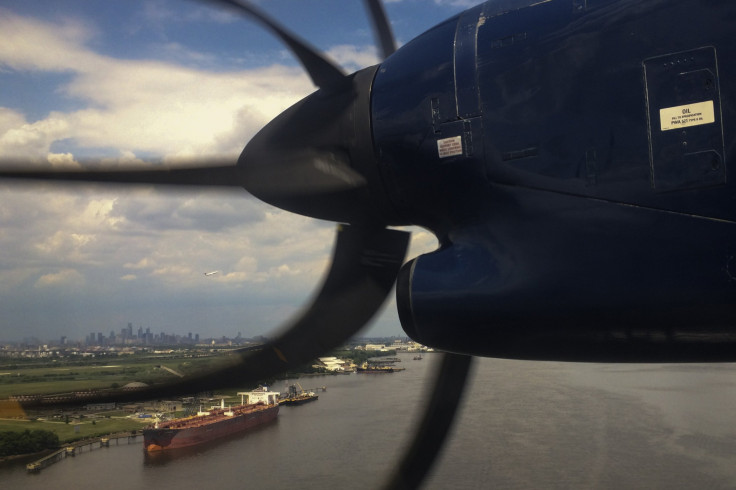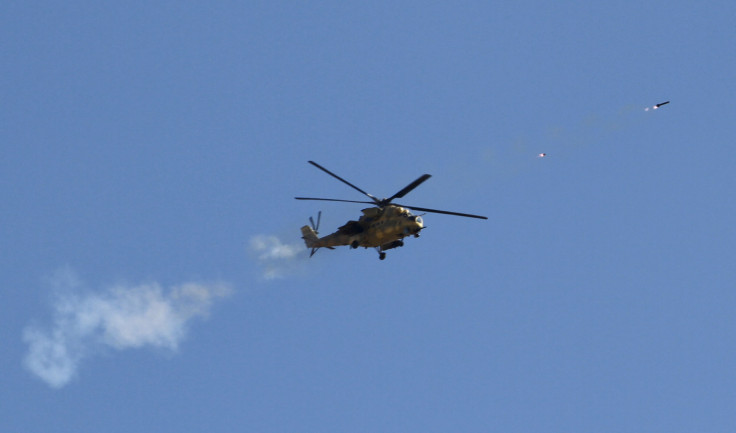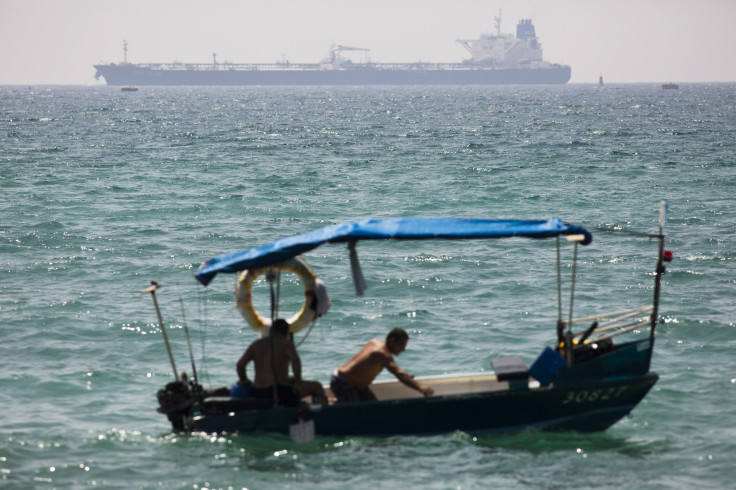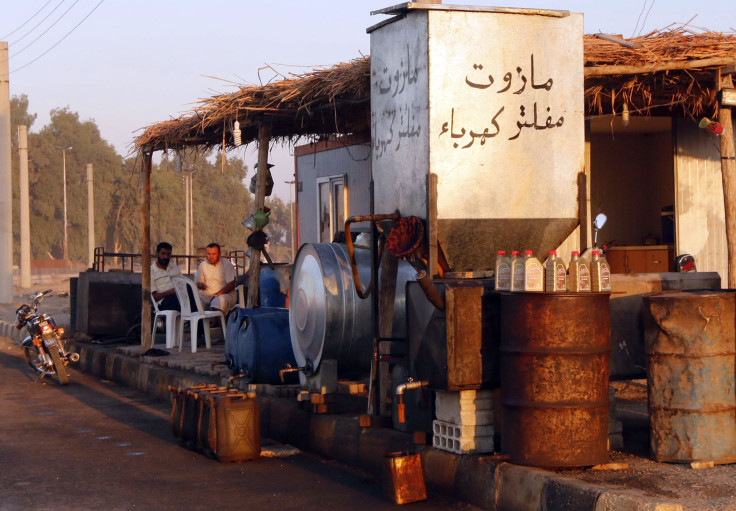How ISIS Oil Ended Up On US Streets

Correction, March 31, 2016, 12:28 p.m. EST A previous version of this article referred to the failure of the U.S. administration to target the Iraq-Turkey pipeline, which the Islamic State group allegedly used to export and trade its oil. The Iraq Oil Report said that was invalid criticism since the refinery in Ceyhan, Turkey, is a closed system that is inaccessible to the militant group. The article also stated that refineries are preparing hundreds of thousands of barrels of crude for transport to ports in Turkey, a job that is actually carried out by oil facilities. This has since been amended.
KIRKUK, Iraq — The recently refurbished tarmac at Maine’s busiest airport contains the usual mixture of gravel, water and chemical binder, but what gives this asphalt its jet-black color is crude oil supplied by the Islamic State group. The Portland International Jetport’s new pavement isn’t the only blacktop of its kind on American soil. Four hundred miles south, highways outside Philadelphia are lined with the same mixture, as are hundreds of potholes on the streets of New York City, a four-month-long International Business Times investigation found.
These are but a few of the many places where ISIS’ oil ends up as part of an illicit business that helps fund the group’s reign of terror, according to Kurdish officials and local police documents. Part of what makes the Islamic State group, known as ISIS, so difficult to defeat is its diverse revenue stream. The Sunni militant group draws income from taxes it levies on the people in conquered lands, kidnapping ransoms and other forms of extortion. But it also makes money to fuel attacks like the ones in Brussels last week by selling a steady stream of oil that flows from ISIS-controlled territories in Iraq to the U.S., parts of Europe and Israel. It’s a constant source of money — as much as $1 million per day at its height — that U.S. and Iraqi officials have failed to halt.
In the aftermath of the Belgium attacks, U.S. President Barack Obama said his priority is defeating ISIS. “There’s no more important item on my agenda than going after them and defeating them. The issue is, how do we do it in an intelligent way,” Obama said at a press conference following the attack last Wednesday. But the U.S. administration, though it has pursued a strategy of striking ISIS’ oil supply centers and mobile refineries, has not choked off the group’s oil reserves completely.
The story of how the Islamic State group profits from crude that makes its way to refineries and storage facilities around the world begins in the central Iraq town of Kirkuk. Here, on the main dusty road that leads into the city, black smoke billows in the distance. Oil facilities managed by the KRG and Baghdad in the contested province can together send several hundred thousand barrels a day of oil for export. Kirkuk’s streets bustle with local markets, where men, women and children buy food to prepare dinner. It’s a lively town despite the frequent car bomb attacks launched by Islamic militants.

Oil and gas officials here in Kirkuk tell International Business Times that ISIS colludes with smugglers in western Iraq and eastern Syria and pays off middlemen working for the Kurdistan Regional Government (KRG) to move oil out of Iraqi Kurdistan.
“ISIS benefited a lot from the oil fields it took over. At the beginning of the conflict, this [smuggling] used to happen a lot. People would buy and sell oil from ISIS and get it through the border in Turkey,” said Brig. Gen. Sarhad Qader, head of police in Kirkuk and its subdistricts. Qader told IBT that he has arrested dozens of ISIS of oil smugglers that have mixed the product with legitimate Kurdish oil. He said that while the region had a difficult time at first cracking down on the smuggling, his team is much more equipped today.
The height of ISIS’ oil sales coincided with a two-year peak in international oil prices and a reign of terror that included the recruitment of thousands of troops and the takeover of large swaths of land in northern Iraq and eastern Syria. Between May 2014 and March the following year, the group’s largely unmonitored oil extraction and export ramped up and fueled ISIS’ early rise to international prominence. By fall of 2015, U.S. airstrikes on ISIS oil facilities in eastern Syria and throughout Iraq had hindered production, but ISIS’ capacity to extract and sell oil remained.

The U.S.’s strategy to combat ISIS doesn’t include attacking the group’s funding sources. Instead, military and intelligence experts say, the U.S. is targeting ISIS finance and oil ministers, as well as storage facilities. But the extraction sites, some refineries, trucking routes and pipelines are still intact. These transportation routes also serve massive global energy companies.
“The problem is, there’s no one on the ground tracking this,” said Denise Natali, an expert on oil in Iraq at the National Defense University in Washington, who explains that the few local officials who are aware of the illicit oil trade are also profiting from it.
The Road to Market
A dirt mound lines the street on a two-lane road leading from Kirkuk to Sulaymaniyah, the oil-rich city near Iraq’s northeastern border with Iran. The mound is a de facto barrier that prevents cars steering off course. Just behind that dirt barrier is a large, black pipe, marked by yellow wooden poles that warn people not to approach. ISIS used this pipeline, along with trucks sent along smuggling routes, to transport its oil to the international market. During former dictator Saddam Hussein’s reign, smugglers amassed wealth and power by taking advantage of these illicit trade routes, which extend deep into the country’s western Anbar province. Following the U.S. military’s exit from Iraq in 2011, Shiite leaders in Baghdad targeted Hussein’s former Baathist supporters in retaliation for aligning with the ideals of a brutal dictator. Frustrated by the suppression under former Prime Minister Nouri al-Maliki, the former Baathists joined ISIS and continued to use the formerly established smuggling networks to make millions of dollars for ISIS.
Andrew Tabler, an expert on ISIS oil at the Washington Institute for Near East Policy, explains that Iraq’s economy has depended on the smuggling routes used to transport not only oil, but other goods, throughout the region. “ISIS was able to take advantage of these kind of smuggling networks that are impervious to politics,” he said.
Even before ISIS began gaining ground after the fall of Iraqi city of Mosul in June of 2014, it had taken control of oil fields, wells and small refineries in eastern Syria and northern Iraq. The group took control of oil fields around the cities of Kirkuk and Baiji. The tradesmen and smugglers responsible for transporting and selling ISIS’ oil would send convoys of as many as 30 trucks at a time to these extraction sites, according to a report written by George Kiourktsoglou, a researcher at the University of Greenwich who studies the group’s oil business.
ISIS sold the bulk of its oil in the region and “exported anywhere from 3,000 to 8,000 barrels a day, about 15 percent of its total production, for sale on the high seas in 2014,” Kiourktsoglou tells IBT.
ISIS had several ways of getting its oil out of Iraq. Sometimes the group hired people to truck the oil to Turkey on the international E90 route, which twists and turns its way east from Lisbon, Portugal, to the Turkish-Iraqi border. That oil trucked to Turkey was often mixed with Kurdish oil. Once in Turkey, the oil would be refined in the southeastern part of the country before sale at either the Port of Ceyhan or the Port of Dortyol, which is located directly across the bay. Other times, it passed off the oil to middlemen who mixed ISIS oil with oil produced by legitimate American and European energy companies for transport via pipeline to Turkey, senior officials in Erbil told IBT.

The oil pipeline system from Iraqi Kurdistan to eastern Syria is an intricate maze of small feeder ducts that lead to a main artery — the Kirkuk-Ceyhan pipeline. This single line is the pipe every major oil company in the region dumps its oil into to transport it to ports in the east. A network of roads connects various pipeline entry points to oil fields and refineries.
As ISIS extended its influence across eastern Syria and parts of Iraqi Kurdistan in 2014, ISIS operatives would pay off workers guarding the Kirkuk-Ceyhan pipeline’s access points to dump its product into mix of all oil flowing out of the region.
Much like an effective money-laundering operation, it was nearly impossible for officials at the end of the pipeline in Turkey to determine illicit batches of oil from those produced by legitimate energy companies.
“Oil is fungible, it is hard to track,” said James Jeffrey, the former U.S. ambassador to Iraq. “Smuggling was happening under our noses [in Iraq] in the 1990s and we tried to stop it. But the smuggling of oil business into Turkey is deeply rooted in infrastructure. It is impossible to shut down without shutting down the entire thing.”
Several American and British companies operate in Iraqi Kurdistan, including Chevron, ExxonMobil, Hess, Marathon Oil and Genel Energy.
Tensions between the Kurdish government and Baghdad only served to strengthen illicit oil exports. For decades, the KRG has wanted to establish independence from Baghdad and the fastest way it knew how was to strengthen the region’s economy by selling as much oil as possible on the international market, Natali said. During the summer of 2014, the Kurdish Government wrested control of its regional fields from the Iraqi leadership in Baghdad and began reaching out to international buyers. Investors rushed into the Kurdish market and jumped on the opportunity to sell oil at cut-rate prices.
The KRG began exporting its discounted crude in May 2014 using its independent pipeline. Baghdad could at one point access it, but fighting and damage to the infrastructure shut the central government off.

Buyers from all over the world — Italy, Cyprus, Malaysia, Hungary and Israel — wanted a piece of the market. Vitol and Trafigura, two of the largest oil-trading firms in the world, made it happen. Starting in 2012, the firms conducted trade of the Kurdish oil through secretive pre-pay deals. The Kurdish government reaped millions and put the money in Turkish bank accounts.
Israel was one of the biggest buyers of the Kurdish oil. Refineries and oil companies in Israel imported more than 19 million barrels of Kurdish oil between the beginning of May and August, according to a report by the Financial Times.
“The buyers of the oil have it imported to Israel first because they know that Iraq won’t try and prosecute,” said Shwan Zulal, the head of Carduchi Consulting, a firm based in London and Iraqi Kurdistan with energy clients with stakes in the oil market in Erbil. “Iraq doesn’t recognize Israel as a country so it is not going to file a lawsuit.”
The only way Iraqi Kurdistan could build up its relationship with new oil traders and companies without angering Baghdad, also a major oil exporter, was to keep the deals under wraps.
“The KRG kept the sale process all confidential,” said Luay al-Khatteeb, an Iraqi oil expert from Brookings Doha Center, a think tank based in Qatar. “The Ministry of Natural Resources acted not only as an energy ministry but also the ministry of finance and kept all the books sealed. There is oil that is unaccounted for.”
The KRG also kept everything under wraps because the majority of the money earned from oil production and export in the region went into the pockets of the leadership in government, said Sherko Jawdat, the chairman of energy and natural resources in the Kurdish parliament in an exclusive interview with IBT. The oil sector, and all of its transactions, were and still are overseen by the KRG, led by President Masoud Barzani.
“Everyone knows this. It is not a secret,” Jawdat said.
“The Mineral and Natural Resource department is not checked or verified by any independent institution. You can’t make right decisions if the information can’t be verified and checked professionally. If it is not audited, then a lot of money will go to special powerful people.”

Oil and gas officials in the KRG, the Kurdish government based in Erbil, told IBT in interviews in Kirkuk and Suleymaniyah that they knew about the mixing of ISIS oil with Western energy companies’ product. They even told their bosses, the prime minister and the president.
“They said the government already started to establish a committee to follow up and verify the case. Finally, they told us that they questioned 15 people regarding illegal trade with ISIS. This was the end of the story [from them],” Jawdat said.
The U.S. government was aware of the illicit sales as well. The State Department told IBT it was aware of the situation as early as June 2014. And in the fall of 2014, prominent U.S. officials started to speak about it publicly.
“As of last month, ISIL was selling oil at substantially discounted prices to a variety of middlemen, including some from Turkey, who then transported the oil to be resold,” said Treasury Department Undersecretary David S. Cohen in October 2014 at the Carnegie Endowment for International Peace, a think tank in Washington. “It also appears that some of the oil emanating from territory where ISIL operates has been sold to Kurds in Iraq and resold into Turkey.”
The State Department described the sale of the ISIS oil as a “drop in the bucket.”
“I took these issues to the State Department when I visited there in December,” Jawdat said. “No one responded, they said, ‘Our priority is security and fighting ISIS.’ ”
Since then, the U.S. government has launched dozens of airstrikes on the terrorist group’s oil facilities and has even captured some of its leaders. But ISIS is still in control of two oil fields in western Iraqi Kurdistan where the group is producing about 20,000 barrels of oil a day.
Iraqi Kurdistan is still trying to establish oversight bodies for the oil market. The informal nature of oil extraction in Iraq — and the chaotic war environment in the region — provided fertile ground for ISIS’ oil business to flourish.
“The government in Baghdad is letting some of this go for now because it preoccupied with the war,” Natali says.
That preoccupation allowed the KRG to kick-start its oil sales with little retribution from Baghdad. At the same time as the Iraqi military focused on fighting ISIS, political leaders and business executives around the world were scrambling to figure out how to keep economies and companies flush with the oceans of oil they required to stay afloat. In May and June of 2014, oil was at $111 per barrel, its highest price in nearly two years. Meanwhile, the KRG was exporting its crude for $40 a barrel, according to two pipeline workers interviewed by IBT.
And that’s how ISIS oil turned up on the streets of New York, courtesy of Axeon Specialty Products LLC, a small New Jersey-based asphalt maker. The company uses petroleum to make its products, and in the spring of 2014, it was looking for bargain buys. Earlier that year, New York private investment firm Lindsay Goldberg purchased half of the asphalt business from NuStar Energy for $175 million. At the time, Rod Pullen, a senior vice president at Axeon said the new co-owners hoped to make the Paulsboro, New Jersey, refinery more efficient.
That June, according to shipping data and U.S. customs documents, Axeon purchased a shipment of the cheap Kurdish crude to feed its operations in New Jersey. At the time, oil experts and watchdog groups were tracking a lawsuit between KRG and Baghdad over oil exports that had left an oil tanker filled with Kurdish crude stuck in international waters off the coast of Texas. That case alerted news organizations to begin following the Kurdish crude to buyers in the U.S.
Like its competitors in the asphalt business, Axeon sought the least expensive crude it could find, and it found its match in KRG. A tanker loaded with KRG oil shipped out of Dortyol, Turkey and delivered 254,840 barrels of crude to Philadelphia on June 6. Axeon has not disclosed what it paid for the oil, but the company said it transported the shipment to its refinery in Paulsboro and used at least of part of the oil to make batches of asphalt that went to the Portland International Jetway and to departments of transportation up and down the eastern seaboard. The deliveries serviced projects that began just weeks after the delivery to Paulsboro.
In a statement prepared for IBT, Axeon said: “Axeon carefully vets all suppliers of oil and receives clear assurances regarding the source and title of any oil it buys. In the late spring of 2014, Axeon committed to purchase two small parcels of Kurdish crude oil from reputable oil traders. Axeon was assured that the oil purchased was 100% sourced from the Kurdish Shaiken field via the Kurdish regional government.”
Back in Iraq, the Kurdish government is busy trying to reach its ambitious production targets. It plans to reach a production pace of about 1 million barrels of oil a day within the next few months. Still, Kurdish officials say they can not guarantee to buyers that their crude is free of ISIS oil.
This story has been updated to reflect that IBT had access to Kurdish government documents.
© Copyright IBTimes 2024. All rights reserved.











